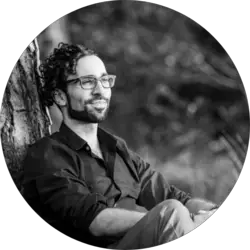![How To Deal With Sensory Overload [9 Tips For Overstimulation]](https://happyrubin.com/wp-content/uploads/2019/12/ik-ben-overprikkeld-150x150.jpg)
Ego In Religious People: Why Do Religions Produce Egoistic People?

How is it possible that in religious people you often encounter such large amounts of unconsciousness, conflict, ego and distance? And we haven’t even talked about violence, terrorism and war. You will find out in this article.
Religions in their purity are an essential guide to spirituality. However, religious people unfortunately often mix their religion with ego. This causes the following problems:
Contents of this page:
Ego Cause 1 – Identification with the belief / religion creates violence
As a result of ego interference, you start to derive your identity from religion. And of course you want to protect that identity. The more you make your beliefs and thoughts your identity, the more cut off you are from the spiritual dimension within you.
Identification (with country, city, neighborhood, religion, job, etc.) makes the other a threat. “I’m an Amsterdammer.” In the same way, the following attachment works: “I am what I believe.” For example, a Muslim who attaches himself to his or her faith as an identity in this way: if someone does not agree with what he or she believes, he thinks: “He rejects me .”
Holding on to faith with attachment is because you have invested in it: you have already identified yourself with it. It seems as if that is your identity: that is the illusion of the ego.
The ego must create opposition so that it can feel itself – so that the ego can continue to “exist.” If everyone agreed, I would lose my artificial mind-made sense of self.
God is synonymous with: the infinite. You cannot say “My God and your God” for you cannot say “My infinite and your infinite”. That shows how absurd it is to say my God and your God.
Ego Cause 2 – Attachment to your own beliefs, not being open to something new, brings war
In addition, the ego ensures that you see your faith as absolute, exclusive truth. Faith is a set of thoughts. Belief as absolute truth does not make you spiritual, but the ego confuses its own opinion with the truth. The human mind confuses its own opinions, views and beliefs for the truth. “This is the way it is.” Dogmas are born like this.
The ego can’t stand hearing anything else, especially because then you have to say, “I was wrong.” But learning involves letting go of the old, not seeking confirmation of what we already know, but seeking new things. And attachment to religion can be limiting at that point. You must be able to examine everything independently, with openness, and not accept it blindly.
Ego Cause 3 – Thinking you know it all … Being right and the other wrong, brings violence
We are surrounded by God (synonymous with Love), but we do not see Him. We miss it because we think we know. Even if you think you know, keep looking. If you know about God, you don’t see Him. The highest knowledge of God is to know Him as unknowable. There is too much talk about God, it must be something private.
Waking up and awakening in love, that’s what religion is all about! But in religious people you see too little love, too little happiness, too little letting go of illusions, mistakes, attachments, cruelty, emotional dependence on others, ‘look at me’, power, nurture yourself in popularity, approval, validation, appreciation, being the boss, winning the race, too little awareness and inner peace, too little awakening …
This is not the fault of religion itself, but this is what people do, or rather their egos. It is not the truth if you use it to correct others or to defend yourself. Then it is an aspect of ego and it is completely meaningless.
‘Neo, sooner or later you’re going to realize just as I did that there’s a difference between knowing the path and walking the path.’
If you want to approach the truth, if you are interested in the truth, you assume nothing at all. If you already have so many assumptions, you cannot get to the truth. If you have already made an assumption, you only look for confirmations for that assumption. You are then no longer open to anything.
“I am right and you are not.” With that you make the uncertain certain. A hopeless mission.
A true seeker of truth has no assumptions, he is just discovering. Are we going to find out or are we just going to try to confirm our assumptions? When someone says, “You’re right,” does that bring you closer? You feel better, but nothing is resolved.
Theologians are the cause of strife. Religion is the cause of light and life, not hatred and division.
In fact, this is the basis of all conflict in the world: “I am right, you are wrong. This is my truth (ego). Our truth (collective ego). My God. Our God. Yours is not the one. We know the truth. ‘ They are all just concepts … Concepts in our mind. You label another human as a non-believer, and ‘non-believers would be bad’ (a different concept) …
Unconsciousness is: being caught in the conceptualized thinking. Being identified with your beliefs. ‘That’s who we are …’
The collective identity in many religions consists largely of: the unbelievers give us our identity. “We define ourselves as the only ones who are right.” If everyone became believers like us, who are we? If everyone had the truth, who are we? Then we lose our identity as the sole holders of the truth.
If we are at peace with everyone, then who are “we”? The separated ego would then cease to exist, and the ego does not want that.
Religions cause violence through spiritual pride and spiritual narcissism

There is a term in Buddhism that explains this problem: Upaya (Skilfull Method). It means that all your good intentions are worthless if you believe that only your truth is the absolute truth.
Unfortunately, we often see this in religious people. In every religion you have people who say, ‘Good that you are a Catholic, but you are only learning the basic virtues. However, there is something higher that {Catholics} don’t understand. Our religion has something more complete. ‘
This happens all over the world: everyone claims to have that extra essence in his / her religion. Why do they do that? Often they say that to get you into their community. Often because they test to see if you fall for it. If you fall for it, they have you. Or rather, then you have yourself. And you work for it and you work for it and you work for it … Until you find out that a monkey was made of you. You were made into a monkey because you could.
You may know what people are like when they get a certain spiritual pride. They belong to a certain spiritual / religious group and they say, ‘We are the ones on the right path. We are the ‘inner group’, the goods, and all other people are off the path. ‘
And then someone surpasses this: ‘In our circles we are more tolerant. We accept all religions and we are all one. ‘ But what they do is play the game of ‘We are more tolerant than you guys’. And in that way the egocentric being always falls into its own trap.
Conflict arises because the fullness of religion cannot possibly be expressed in language or thought

Spiritual concepts and spiritual thoughts do not exist. Thoughts are not spiritual because thoughts are forms . Spirituality is the formless dimension within you. The truth (of a religion) cannot be spoken or thought. Concepts (thoughts and words) cannot fully represent the truth. Through the power of the now , truth (God) can manifest itself, through you, in actions. A healthy attitude is: ‘I don’t know anything, the truth cannot be told / understood.’
Those who know do not speak.
Those who speak do not know.
Suppose there are two blind men who do not know the color green. A friend of one blind man is eager to explain, saying it’s like soft music. Another tells the other blind man: it is like soft satin. Days later, the two blind men beat each other’s brains. “Green is like soft music!” “No, it’s like soft satin !!” But neither of them know what they are talking about! Because if they really knew, they weren’t talking about it.
If you have certain assumptions about ultimate reality and are going to tell them in words to others, you are talking nonsense. Because you cannot say anything specific about Everything. Suppose you want to say, “God has a form.” But if God is all that is, it has no boundary, so He cannot have form. You also need to have a shape outside of it so it can have a shape. If you are going to say this after all, then you are sensitive to becoming attached to your beliefs.
And make no mistake: Atheism is also a belief system. The atheist positively denies the existence of God, and uses language to do so.
Concepts are not truth, they are too limited. Do not seek truth. Let go of your concepts, opinions and judgments. And you will see!
Spiritual concepts and thoughts do not exist. Thoughts are not spiritual because thoughts are form. Spirituality is the formless dimension within you.
If you want to convince someone of something, it often stems from the fact that you are not completely convinced of it yourself. If you were actually convinced of it, you wouldn’t want to convince others with your words. I also try not to convince people that I am human.
If we pay more attention to talking about faith than to practice it, then spirituality remains an ideology , creating theological conflict. But as we focus on following the lessons in this life, we realize that the love Jesus taught us is no different from the love Muhammad taught us and the compassion the Buddha taught us. Practice what you preach.
Wanting to put the ‘truth’ into words leads to violence and war
Why do countries and families go to war? They think they know the truth. Someone is saying something that is beyond the bounds of where your truth lies. You will then want to correct them. Unconsciously. Even if you consciously decide to hold back. Your definition of truth then quietly lives in you aggressively. We collect, defend, and project concepts of truth onto others because we don’t feel safe, so we don’t feel good enough.
You have taken a journey to discover your truth. You realized at a point in your life that this is not the whole truth. How can it be the truth if it doesn’t work for everyone? Anyone who insists the truth is never happy about it. There has to be something deeper: something spiritual.
The deepest truth does not require your defense, nor does it inspire conflict.
You can describe the truth with words, but the words are not “it.” No statement is absolutely true. The statements only point to it. They are just pointers. Even the highest teaching, the highest quote, even something like “All people are equal!” causes conflict and distance in this way, as it remains a pointer.
Because put someone who wants to proclaim ‘We are all one’ between people who have never heard of that, and then there will be debate and polarization, and the person with his ‘we are all one’ concept will think, they know less than me. That is a thought full of conflict, distance and inequality. Think of the NLP pillar ‘Everyone has their own truth. ‘Does a child think there is a monster under the bed? In the child’s experience, in the child’s experience, the monster under the bed is true.
You are practicing your peace-loving faith by not talking about your peace-loving faith.
All religions / revelations point their finger to the moon, the light. What the ignorant see is only the finger. Ultimately, it doesn’t matter which finger we use to point to the moon. The moon is important. ‘I prefer this finger pointing to the moon. “No, this finger pointing to the moon is much nicer.” The truth is far more comprehensive than the mind can ever comprehend. Understanding this truth means feeling deep within the truth to which they point. No thought or words can capture the truth. At most they can point to it.
The Solution to Violence and War: Goodness Over Truth

Your truth is actually not the truth. There is a field of existence behind every truth. Even behind that “We are all one.” We are all one, but that is a different story. That field behind every “truth” is goodness. Goodness can be experienced, but not conceptualized. Goodness has nothing to defend and has no interest in correcting others. Goodness is truth in motion. Consider the statement: ‘Too good to be true’. Goodness is the living expression of truth. The universe can be illuminated in this way through your form.
Remain in noble silence and let your religion speak through your deeds of love.
What else can you pay attention to? In a certain setting, don’t polarize with your spiritual truths, but meet people where they are. If you tell a child who thinks there is a monster under his bed that it is not true, you are disrupting the child’s truth and experience.
Become one with the truth: manifest the truth in action. Taste and feel how truth moves, not wanting to know what truth is. The question is not what the truth is (debate, conflict: is worthless), but how the truth feels. Walk the way from truth to goodness.
If you want goodness, you use goodness and don’t talk about it. Talking about the truth does not lead you there, but fundamentalism.
Become a full embodiment of goodness, a full expression of goodness: good deeds. You then set the truth in motion again. And what you set in motion feeds the energy field and, through your vibrations, the blessings you give to others brings infinite blessings to the world, and sets in motion a whole transformation over time. That is the path of goodness. Then you feel so good and amazed at yourself!
O Son of Dust! Truly I say to you, of all men he is the most negligent, who contends uselessly and tries to exalt himself above his brother. Hear, O brothers! Let actions, not words, adorn you.
Bahá’u’lláh
The moment you learn the truth, it is true. But as you get older, the truth changes again. We are constantly looking for the truth. Your consciousness is then expanded. You see a hidden reality that was previously invisible and suddenly becomes visible, and you think: that is the truth. And that again increases your consciousness, and you see another truth, a new hidden reality.
What is the potential problem in this? Every time you have found a piece of truth, you put yourself in a situation where you are invoking / manifesting conflict on your life. So make the truth a campaign, something you can repeat, a belief. Then you free yourself from endlessly checking what the truth is, but then you allow the truth to come to life in you.
“Don’t condemn if you see a person has a dirty glass of water, just show them the clean glass of water that you have. When they inspect it, you won’t have to say that yours is better.”
– Malcolm X
How can I manifest goodness?

When someone is angry, you can’t say, “Let’s talk about spirituality!” Be smarter than that. Manifest goodness. Manifest goodness. Manifest goodness. You just need to know the goodness of yourself and pass it on to others. Below are ways to do that:
- A very simple opportunity to actually exercise your spirituality: give a compliment. What you give is also relevant to your journey: the world is your mirror.
- See only the good in the other. Don’t criticize and let negative patterns emerge.
- Be open .
- Be empathetic .
- Have genuine love .
- Have patience.
- Adapt: you are not reactive but proactive .
- Trust in God .
- Take care of the other.
- Show respect.
- Be without prejudice .
- Be inspiring and inviting.
- Be happy for the other person’s progress.
- Support the other.
- Be humble.
- Listen .
- Don’t be competitive.
- Be open to learn from the other.
Most importantly, you have always been a manifestation of goodness, but you are not yet a conscious manifestation of goodness. So find things you do well every day. Then compliment yourself. This increases the energy and your vibration. Any imbalance then disappears. Compliment yourself as often as possible until you become a spiritual superhero. Not looking at what needs to be improved. That’s logic. We have to go beyond that and see the good things. Let’s start complimenting our abhorred behavior! Then we will no longer display that behavior. Give karma. If you want to find heaven, be an angel.
Religion must unite all hearts and make wars and strife disappear from the face of the earth. Religion must be the cause of spiritualization and bring light and life to every human being. If religion becomes the cause of aversion, hatred and division, it would be better without religion. life … A religion that does not cause love and unity is not a religion. “
‘Abdu’l-Bahá in’ Bahá’u’lláh and the New Era ‘, JE Eslemont, 2nd ed. 1978, p. 160.
We must treat even unconscious people with kindness. People who have been victims themselves project that on others: people who abuse have never been complimented. They try to hurt others, but actually want to say, ‘I want to take the pain out of my body. I want to show someone else the pain that is inside me. I can’t talk about this, I’m sharing this by victimizing someone else. ‘ It’s a harsh reality, there’s nothing funny about it.

![5 Best Self Care Tips For College Students [#1 Advice]](https://happyrubin.com/wp-content/uploads/2021/09/the-best-self-care-tips-for-college-students-440x264.jpg)
![How To Stick To New Year’s Resolutions: 9 Tips [Smart & Sure Ways]](https://happyrubin.com/wp-content/uploads/2019/12/tips-voor-goede-voornemens-440x264.jpg)
![How To Stop Being So Hard On Yourself [9 Great Tips]](https://happyrubin.com/wp-content/uploads/2019/12/we-moeten-zoveel-van-onszelf-en-anderen-150x150.jpg)

![19 Best Ice Breaker & Get-To-Know-Eachother Games [Fun & Simple]](https://happyrubin.com/wp-content/uploads/2018/02/leukste-ijsbrekers.jpeg)
![Becoming More Social: 41 Tips [Improving Social Skills] [List]](https://happyrubin.com/wp-content/uploads/2018/06/sociale-vaardigheden1.jpeg)
![How to start a conversation with anyone: 15 tips [Making contact]](https://happyrubin.com/wp-content/uploads/2017/08/gesprekstechnieken1.jpeg)
![372 Friend Tag Q&A Questions [Best Friend Quiz]](https://happyrubin.com/wp-content/uploads/2019/05/best-friend-tag-vragen-voorbeelden.jpg)



![Clingy & controlling behavior of partner/date [Extreme examples]](https://happyrubin.com/wp-content/uploads/2020/06/claimerig-gedrag-van-partner-eigenschappen-en-voorbeelden-150x150.jpg)

![How to recognize if a man is in love [Signals & his body language]](https://happyrubin.com/wp-content/uploads/2020/05/verliefd-gedrag-van-mannen-herkennen-150x150.jpg)


![Free will and religion / theology [Verses & Quotes on free will]](https://happyrubin.com/wp-content/uploads/2020/10/religion-on-free-will-quotes-1050x640-1-150x150.jpg)

![Dealing With Setbacks & Hardship [Lessons & Examples]](https://happyrubin.com/wp-content/uploads/2018/11/omgaan-met-tegenslag-tips-hoe-dan.jpeg)
![NLP Agreement Frame: Use these exact sentences [Examples]](https://happyrubin.com/wp-content/uploads/2020/10/agreement-frame-nlp-1125x640-1-440x264.jpeg)
![122 Best Comebacks In Any Situation [Best Examples]](https://happyrubin.com/wp-content/uploads/2020/06/beste-comebacks-technieken-tips-440x264.jpg)
![Using Hypnosis to Stop Smoking [HowTo]](https://happyrubin.com/wp-content/uploads/2020/05/stoppen-met-roken-door-hypnose-150x150.jpg)
![Presuppositions language pattern: meaning & examples [NLP]](https://happyrubin.com/wp-content/uploads/2020/04/wat-zijn-vooronderstellingen-150x150.jpg)
![Peripheral Vision: Meaning & Exercise [Essential Skill]](https://happyrubin.com/wp-content/uploads/2020/04/perifeer-zicht-trainen-tips-150x150.jpg)

![How To Start A Coaching Business [21 Smart Tips]](https://happyrubin.com/wp-content/uploads/2018/11/coachingpraktijk-starten-tips.jpeg)
![How to make dreams come true? [33 tips to realize dreams 100%]](https://happyrubin.com/wp-content/uploads/2018/05/dromen-mijlpalen.jpeg)
![How To Become Rich? 27 Millionaire Tips [Guaranteed To Work]](https://happyrubin.com/wp-content/uploads/2018/01/hoe-kan-ik-rijk-worden.jpeg)
![77 Best Online Marketing Tools [Recommendations] [Also Free]](https://happyrubin.com/wp-content/uploads/2018/08/beste-onlne-marketing-tools-tips.jpeg)
![Complete List Of Virtues & Qualities [Including Explanation]](https://happyrubin.com/wp-content/uploads/2018/12/kernkwaliteiten-uitleg.jpeg)
![Being Attentive: How Do You Do That? [Meaning & 9 Tips]](https://happyrubin.com/wp-content/uploads/2019/05/attent-zijn.jpg)
![Being Conscientious: Meaning Of This Virtue [Explained]](https://happyrubin.com/wp-content/uploads/2018/07/Consciëntieus-persoon.jpg)


![Best Books About Burn-Out [Top 10] [Update 2025]](https://happyrubin.com/wp-content/uploads/2020/06/beste-boeken-over-burnout-lijst-440x264.jpg)
![Best Self-love Books [Top 10] [Update 2025]](https://happyrubin.com/wp-content/uploads/2020/04/beste-boeken-over-zelfliefde-aanraders-440x264.jpg)
![Life changing books: 10 books that change your life [2025 Update]](https://happyrubin.com/wp-content/uploads/2020/03/levensveranderende-boeken-tips-150x150.jpg)
![Top 10 Best Books: Recommendations Per Genre [2025 Update]](https://happyrubin.com/wp-content/uploads/2019/12/best-books-per-genre-150x150.png)
![Best Books On procrastination: Must Reads [List] [2025 Update]](https://happyrubin.com/wp-content/uploads/2019/11/beste-boeken-over-uitstelgedrag-tips-150x150.jpg)
![Joe Dispenza: Events To Attend [2025 & 2026] [All Info]](https://happyrubin.com/wp-content/uploads/2020/02/joe-dispenxa-events-440x264.png)
![Best Online Study Options [Online Education Top List]](https://happyrubin.com/wp-content/uploads/2019/03/best-home-study-options-440x264.png)
![Teachable Review & Experiences 2025 [Bad Online Training Tool?]](https://happyrubin.com/wp-content/uploads/2020/02/Teachable-review-ervaringen-150x150.png)
![Audible Review, Experiences & Special Discount [Scam?]](https://happyrubin.com/wp-content/uploads/2020/01/audible-review-ervaringen-150x150.png)
![Guest Posts Wanted [Free & Always Directly Accepted]](https://happyrubin.com/wp-content/uploads/2019/05/gastbloggen-regels.jpg)

Another great article! Rubin you analyze the problems alertly, precisely and clearly and at the same time gives an opportunity to grow spiritually, through good and pure deeds. Thank you!